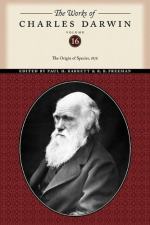In considering these several means of distribution, it should be remembered that when a pond or stream is first formed, for instance, on a rising islet, it will be unoccupied; and a single seed or egg will have a good chance of succeeding. Although there will always be a struggle for life between the individuals of the species, however few, already occupying any pond, yet as the number of kinds is small, compared with those on the land, the competition will probably be less severe between aquatic than between terrestrial species; consequently an intruder from the waters of a foreign country, would have a better chance of seizing on a place, than in the case of terrestrial colonists. We should, also, remember that some, perhaps many, fresh-water productions are low in the scale of nature, and that we have reason to believe that such low beings change or become modified less quickly than the high; and this will give longer time than the average for the migration of the same aquatic species. We should not forget the probability of many species having formerly ranged as continuously as fresh-water productions ever can range, over immense areas, and having subsequently become extinct in intermediate regions. But the wide distribution of fresh-water plants and of the lower animals, whether retaining the same identical form or in some degree modified, I believe mainly depends on the wide dispersal of their seeds and eggs by animals, more especially by fresh-water birds, which have large powers of flight, and naturally travel from one to another and often distant piece of water. Nature, like a careful gardener, thus takes her seeds from a bed of a particular nature, and drops them in another equally well fitted for them.
On the inhabitants of oceanic islands.
We now come to the last of the three classes of facts, which I have selected as presenting the greatest amount of difficulty, on the view that all the individuals both of the same and of allied species have descended from a single parent; and therefore have all proceeded from a common birthplace, notwithstanding that in the course of time they have come to inhabit distant points of the globe. I have already stated that I cannot honestly admit Forbes’s view on continental extensions, which, if legitimately followed out, would lead to the belief that within the recent period all existing islands have been nearly or quite joined to some continent. This view would remove many difficulties, but it would not, I think, explain all the facts in regard to insular productions. In the following remarks I shall not confine myself to the mere question of dispersal; but shall consider some other facts, which bear on the truth of the two theories of independent creation and of descent with modification.




